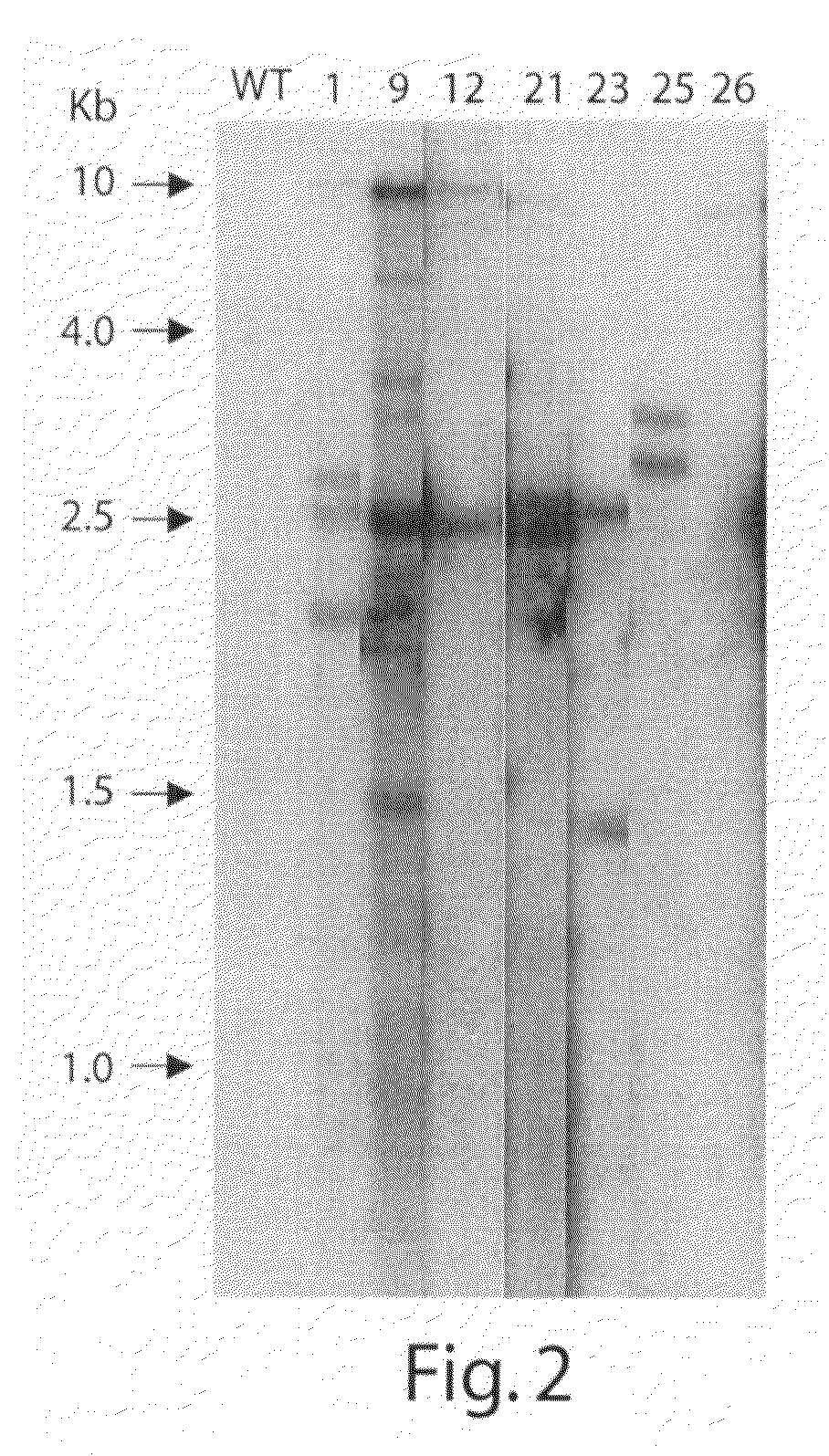Compositions and Methods of Increasing Stress Tolerance in Plants
a technology of stress tolerance and plants, applied in the direction of transferases, enzymology, bryophytes, etc., can solve the problems of limiting plant growth and crop productivity in agriculture, profound effects on plant growth and development, etc., to increase biomass, increase stress resistance, and increase yield
- Summary
- Abstract
- Description
- Claims
- Application Information
AI Technical Summary
Benefits of technology
Problems solved by technology
Method used
Image
Examples
example 1
Cloning of Arabidopsis thaliana FTA and Construction of Transformation Vector
[0190]The Arabidopsis thaliana FTA sequence was obtained by RT-PCR from total RNA isolated from leaf tissue using primers corresponding to SEQ ID NO:11 and SEQ ID NO:12. The resulting fragment was digested with BamHI and SmaI and cloned into the plasmid pCR2.1 The Clonetech vector pBI121 was used as the backbone for the antisense construct. The GUS gene was removed by BamHI and Eco1CRI digestion and replaced with the FTA insert that was cut from pCR2.1-FTA using SmaI and BamHI and ligated into the vector SEQ ID NO:4.
TABLE 1SEQ ID NO:11:5′-AAAGGATCCTCAAATTGCTGCCACTGTAAT-3′SEQ ID NO:12:5′-AAACCCGGGATGAATTTCGACGAGAACGTG-3′
example 2
Cloning of Non-Full Length Brassica napus FTA and FTB Nucleic Acid Sequences
[0191]RNA was isolated from leaf and root tissue using the Qiagen RNeasy kit. RT-PCR was performed by known techniques using the primers shown in Table 2. The FTA sequence was obtained using the primer pair SEQ ID NO:19 and SEQ ID NO:20. The FTB sequence was obtained using the primer pair SEQ ID NO:21 and SEQ ID NO:22.
TABLE 2SEQ ID NO:19:5′-GGATCCATGGATTACTTCCGTGCGATTTACTTCTCC-3′SEQ ID NO:20:5′-AAAAAGCTTCCATGCCCAATAGTTAGCTCTTATTGGATC-3′SEQ ID NO:21:5′-AAAAAGCTTTGGCTTTGTTACTGGATTCTTCATTCAAT-3′SEQ ID NO:22:5′-AAATCTAGAAGCTTCATAATACCGATCCAAGACAATGTT-3′
[0192]PCR products were separated from the RT-PCR reaction mixture using the Qiagen PCR column spin kit and ligated into the cloning vector pBluescript KS+. The vector was digested with EcoRV and treated with Taq polymerase in the presence of dTTP to produce a 3′ overhang for ligation with the PCR products. The ligation products were transformed into E. coli DH5α ...
example 3
Cloning of Non-Full Length FTA and FTB Nucleic Acid Sequences from Glycine max and Zea maize
[0193]RNA was isolated from leaf and root tissue using the Qiagen RNeasy kit. RT-PCR was performed by known techniques using the primers shown in Table 3. The Glycine max FTA sequence was obtained using the primer pair SEQ ID NO:23 and SEQ ID NO:24. The Glycine max FTB sequence was obtained using the primer pair SEQ ID NO:25 and SEQ ID NO:26. The Zea maize FTB sequence was obtained using the primer pair SEQ ID NO:27 and SEQ ID NO:28.
TABLE 3SEQ ID NO:23:5′-AAAGGATCCATGGAATCTGGGTCTAGCGA-3′SEQ ID NO:24:5′-AAATCTAGAAGGAAGTCTGCTCTTGCGC-3′SEQ ID NO:25:5′-AAATCTAGAGCCACCATTCCTCGCAACG-3′SEQ ID NO:26:5′-AAAGAGCTCGTGGTGGAGAATCTGGGTGC-3′SEQ ID NO:27:5′-GGCGGATCCCGACCTACCGAGG-3′SEQ ID NO:28:5′-AAAGAGCTCGTGGATGGATTGGCTCCAGC-3′
[0194]PCR products were separated from the RT-PCR reaction mixture using the Qiagen PCR column spin kit and ligated into the cloning vector pBluescript KS+. The vector was digested ...
PUM
| Property | Measurement | Unit |
|---|---|---|
| Tm | aaaaa | aaaaa |
| temperature | aaaaa | aaaaa |
| temperature | aaaaa | aaaaa |
Abstract
Description
Claims
Application Information
 Login to View More
Login to View More - Generate Ideas
- Intellectual Property
- Life Sciences
- Materials
- Tech Scout
- Unparalleled Data Quality
- Higher Quality Content
- 60% Fewer Hallucinations
Browse by: Latest US Patents, China's latest patents, Technical Efficacy Thesaurus, Application Domain, Technology Topic, Popular Technical Reports.
© 2025 PatSnap. All rights reserved.Legal|Privacy policy|Modern Slavery Act Transparency Statement|Sitemap|About US| Contact US: help@patsnap.com



